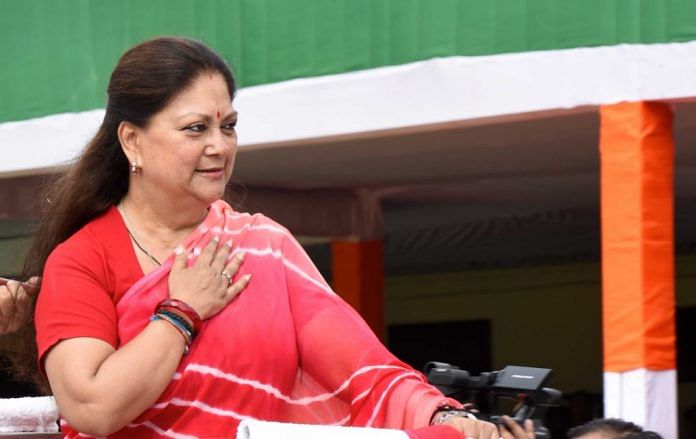Rajasthan government’s controversial new ordinance imposes a six-month ban on the media on publishing details about public servants or judges who are under investigations. It also bars courts from taking up complaints against public servants without the government’s approval.
What is the political and legal wisdom of the media-gagging ordinance passed by Rajasthan government? We bring sharp voices.
This ordinance can barely last a few minutes if challenged in the Rajasthan High Court or the Supreme Court
 K.V.Dhananjay
K.V.Dhananjay
Advocate, Supreme Court
The Criminal Laws (Rajasthan Amendment) Ordinance/Bill of 2017 is an outrageous piece of legislation. Whichever lawyer proposed and drafted it appears to be terribly ignorant of our criminal law, criminal procedure and the Constitution. Our Criminal Procedure Code of 1973 and the penal statutes such as the Indian Penal Code, 1860 and the Prevention of Corruption Act, 1988 do not structurally support the notion of a ‘prior permission’ or ‘sanction’ for initiating a criminal investigation.
The very concept of a ‘prior permission’ or ‘sanction’ to investigate a crime is legally absurd. The purpose of an investigation is to collect material evidence and marshal witnesses to prove the guilt of the accused in a court of law; the sanctioning authority would be clueless on how to proceed unless the case is first investigated and material collected.
Imagine if your doctor recommends a blood test to diagnose sickness, but the lab technician asks you to first produce a lab certificate of abnormality in your blood!
This law does not seem to have any objective other than to save crooks among public servants. Under the constitution, no media or member of the public could be gagged or punished for reporting allegations of misconduct or corruption among public servants; the proposed law is plainly unconstitutional.
Even in cases where a public servant is investigated, charged, tried and acquitted by a court, the media or the public may take that very material before the acquitting court and publicly express an opinion that the public servant concerned is guilty of those crimes. The legal standard for expressing a reasonable public opinion is vastly different from the legal standard for awarding conviction in a criminal case.
This ordinance can barely last a few minutes if challenged in the Rajasthan High Court or the Supreme Court.
The reason for the ordinance is to prevent the corruption allegations from engulfing the CM and her ministers
 Ghanshyam Tiwari
Ghanshyam Tiwari
BJP MLA, Rajasthan
The ordinance has been brought in for only one reason. The reason is to protect the chief minister, ministers and officers from corruption allegations. This is will drastically affect the work done by the media, police, judiciary, and RTI activists. Until the government gives permission, you cannot publish the names of people accused in wrongdoing in the media or social media. Until government permission is given, a complaint in a civil or criminal court cannot be published.
Permission will take six months, and if the permission is not given, there is no requirement to give a reason either. The details will also not be given under an RTI query. If somebody publishes the details without permission, then they can be jailed for two years. The restrictions on press and judiciary means the government holds all the controls. This runs counter to all democratic principles.
Many of the Chief Minister Vasundhara Raje’s people are caught in corruption scams. In recent past, we have seen a series of scams in mining sector, MNREGA and NHRM. Officials have been caught, and now the dirt is reaching her ministers and threatens to engulf them too. This ordinance is an effort to stop it.
I have seen the draconian days of Emergency, and I had agitated against it. Is this what I fought against the Emergency for? With this ordinance, Vasundhara Raje has defamed the BJP’s image across the country in just one day. She has to withdraw it or she should be removed from her post. I raised the issue in the assembly today and walked out. I represent the people, so I will continue to raise this issue among the people. I will also go to court against it.
Police can be co-opted during the 180 days by powerful people to clean up the records, get rid of evidence
 Kamal Tank
Kamal Tank
RTI activist, Jaipur
Under the new ordinance, the media can only publish names and details of politicians, judges or officials in any case until the government grants permission. On the face of it, they are not denying permission, they are just delaying it. But this also means that the government has 180 days to manipulate the case in their favour.
This has two sides: one is that if an honest person is being accused of something wrongly, this gives protection. There will be an investigation into the basis of allegations against the honest person. But the flip side is that this gives time to the corrupt person to clean up the records, get rid of evidence and facts of the case.
In a country, where all laws are misused, this too shall be misused by those in power. While I agree that 99 guilty people can go scot-free but even one honest person must not be caught, but this law is most likely to be used to protect the guilty.
Police can be coopted during the 180 days by powerful people who have the government machinery or money power in their hands.
Whatever space there was for activists like me to question people in power is going to shrink with this ordinance. The government says that in most of the corruption complaints, the complainants turn hostile. But that happens because enormous pressure is brought upon complainants. This ordinance will now institutionalise the time and space for such pressures to be mounted.
The ordinance confirms the phenomenon of governments in their final year thinking of hare-brained ideas in panic
 Shekhar Gupta
Shekhar Gupta
Editor-in-Chief, ThePrint
The Rajasthan government’s idea of gagging its critics –specifically journalists — through legislation isn’t the first time for a government. It confirms the phenomenon of governments approaching the final year of its term, usually looking down the barrel, thinking of such hare-brained ideas in panic.
Two others have done so in recent times before Rajasthan: the scam and crisis-ridden UPA with its Section 66A of the Information Technology Act and Bofors-struck Rajiv Gandhi with his anti-defamation bill. Both attempts had failed. The laws were defeated and the losers earned even more infamy. This, exactly, will be the fate of this ridiculous Rajasthan Bill.
There is twin-purpose here. One, to protect civil servants and ruling politicians from investigations (not just prosecution) without government sanction. This is touching for a party which had come out in such passionate support of Anna Hazare’s Jan Lok Pal movement.
Judges have also been thrown into the mix probably to give the judiciary a vested interest too. Why they should bother, beats me. The law of contempt gives them much greater protection. In any cases, only judges probe judges.
Rajasthan chief minister Vasundhara Raje is probably smarting because Ashok Singhvi, one of her favourite officers was recently investigated by the Anti-Corruption Bureau and she was forced to arrest him.
The larger motivation is the old one: fear and anger. Fear, because with just 11 months left to the polls, her prospects look the shakiest of all BJP incumbents. And anger at her inability to regain control. The gag on the media–on the fear of sending journalists to jail–is more of the same old shoot-the-messenger. Just made more contemporary as jail-the-messenger.
It will fail, as it did, with Rajiv and UPA. It will bring her infamy. Which is doubly regrettable because for years we have known her as among the more modern and liberal voices in the BJP, especially as the daughter of the Rajmata who was jailed during the Emergency.
The ordinance of the Rajasthan government only seeks to formalize a settled position of law
 Sanjay Dixit
Sanjay Dixit
IAS of Rajasthan cadre
The uproar against the so-called media-gag ordinance brought in by the Rajasthan government is much ado about nothing. Misuse of provisions of S 156(3) of the CRPC has become rampant, especially after the RTI Act came into being and became fully operational.
The abuse of the judicial process became so glaring that the Supreme Court had to intervene in Anil Kumar v MK Aiyappa, (2013) 10 SCC 705, and lay down guidelines to prevent the abuse of the process. This has been further upheld in the L. Narayana Swamy v. State of Karnataka, (2016) 9 SCC 598, and Priyanka Srivastava v. State of UP, (2015) 6 SCC 287.
Thus, the ordinance only seeks to formalise a settled position of law. In spite of the SC Judgments, cognisance was still being taken by some courts under S. 190, Cr. PC. It is, therefore, only logical that Rajasthan should clear the confusion.
As far as the media gag is concerned, it is fully in consonance with Art. 19(2) of the Constitution, which lists defamation as one of the exceptions to Freedom of speech, which cannot extend to defaming government servants on the basis of complaints that have had only 27% success till date. The provision of deemed sanction actually advances the cause of probity as many cases have just dragged on because decisions on sanctions have been unconscionably delayed.
The morale of officials is at an all-time low with more than a dozen agencies scrutinizing each and every action of theirs with a toothcomb at every step. So it is important to give some space to the official machinery to discharge their duties without fear or favour. There is no blanket ban either. So the outrage is a bit premature.
Rajasthan government wants to appropriate the powers of judiciary
 Rameshwar Dudi
Rameshwar Dudi
Leader of Opposition, Rajasthan, Congress MLA
This is a black law brought in by the Rajasthan BJP government. But inside legislative assembly, we have fully opposed this ordinance because this will encourage corruption and hide all their black deeds and corruption scams. It also harms democracy in two very significant ways: the government wants to appropriate the powers of the judiciary, and endangers the freedom of the media, which is the fourth pillar of democracy.
No FIR can be registered against any official until the government gives permission in 180 days. Under 156 (3), a citizen can go to court to complain if the FIR is not registered at a police station. The court will then direct police to register. Now, that route is closed.
In the last four years, many of the officers, current and previous, are named in various scams. This ordinance seeks to protect these officers in advance.
Many BJP members are unhappy over this ordinance but they are all sitting like Dhritrashtra. If they speak up their political career is over.
Tyranny is the basis of everything this government does. Farmers are unhappy because they are not getting the MSP, they are suffering under the weight of loans. Agricultural implements have been brought under GST. They have not created the 15 lakh new jobs they promised. They closed 18000 government primary schools. If you don’t have teachers, appoint the them, don’t close the schools. In the context of the Bikaner gangrape, the state home minister said he cannot send policemen to each home, and it is the responsibility of parents to protect the daughters. People are already very unhappy, and now this ordinance will make them more suspicious.



